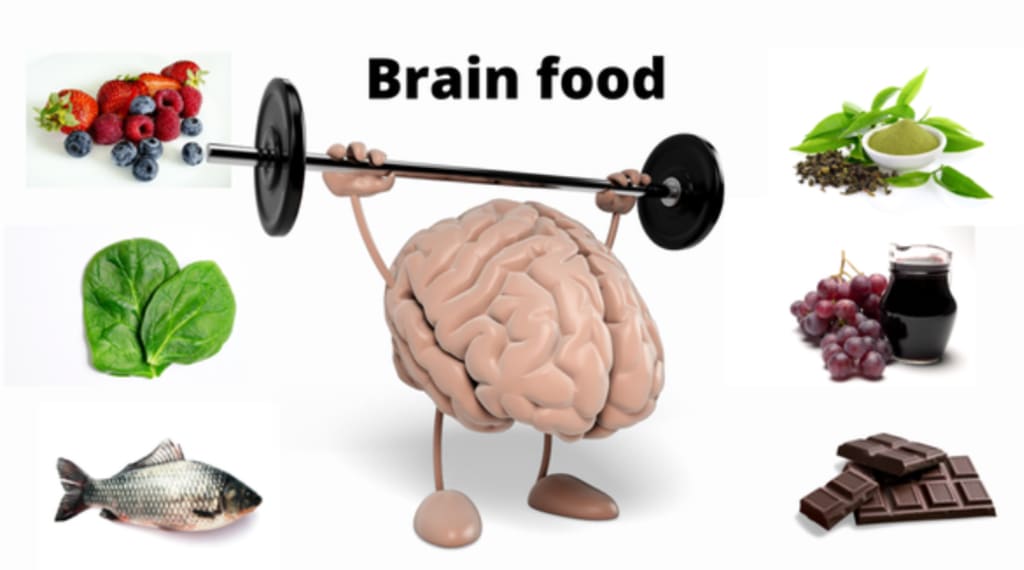your mind doesn’t work well when it lacks specific nutrients
How does lack of nutrients affect mental health?

### Your Mind Doesn’t Work Well When It Lacks Specific Nutrients
In today’s fast-paced world, it's easy to overlook the connection between our diet and mental well-being. We often think of food in terms of weight management or physical health, but what about the brain? The brain, much like any other organ, requires a steady supply of nutrients to function optimally. When it doesn't get these essential nutrients, the effects on cognition, mood, and overall mental health can be profound.
#### The Brain: A Nutritional Powerhouse
The human brain, though it accounts for only about 2% of body weight, consumes about 20% of the body's energy. This high demand underscores the importance of a nutrient-rich diet for maintaining cognitive function and mental health. Let’s delve into the critical nutrients that keep our brains sharp and our minds balanced.
### Essential Nutrients for Brain Health
1. **Omega-3 Fatty Acids**
- **Role**: Omega-3s, particularly DHA (docosahexaenoic acid), are crucial for the structural integrity of brain cells and the formation of synapses, which are essential for learning and memory.
- **Sources**: Fatty fish like salmon, mackerel, and sardines, as well as flaxseeds, chia seeds, and walnuts.
- **Impact**: Deficiency in omega-3s has been linked to cognitive decline, poor memory, and even increased risk of depression.
2. **B Vitamins (B6, B9, B12)**
- **Role**: B vitamins play a vital role in energy production, neurotransmitter synthesis, and the maintenance of brain tissue.
- **Sources**: Leafy greens, eggs, legumes, nuts, and fortified cereals.
- **Impact**: Inadequate levels can lead to fatigue, memory problems, and mood disturbances. B12 deficiency, in particular, is associated with cognitive decline and neurodegenerative diseases.
3. **Antioxidants**
- **Role**: Antioxidants protect the brain from oxidative stress, which can damage cells and contribute to aging and degenerative diseases.
- **Sources**: Berries, dark chocolate, nuts, seeds, and vibrant vegetables like spinach and kale.
- **Impact**: A diet rich in antioxidants can enhance memory, cognitive function, and protect against mental decline.
4. **Amino Acids**
- **Role**: Amino acids, the building blocks of proteins, are essential for neurotransmitter production and brain cell communication.
- **Sources**: Meat, dairy products, eggs, soy, and legumes.
- **Impact**: Lack of essential amino acids can impair mood regulation and cognitive processes, leading to symptoms like depression and anxiety.
5. **Vitamin D**
- **Role**: Known as the “sunshine vitamin,” vitamin D is crucial for brain development, function, and overall mood regulation.
- **Sources**: Sunlight, fortified foods, fatty fish, and mushrooms.
- **Impact**: Deficiency in vitamin D is associated with cognitive impairment, depression, and increased risk of neurodegenerative diseases.
6. **Magnesium**
- **Role**: Magnesium supports nerve function, regulates neurotransmitters, and is involved in energy production.
- **Sources**: Nuts, seeds, whole grains, leafy greens, and dark chocolate.
- **Impact**: Low magnesium levels can lead to irritability, anxiety, and difficulty concentrating.
### The Consequences of Nutritional Deficiency
When the brain lacks these essential nutrients, the consequences are not just limited to physical symptoms but extend deeply into our cognitive and emotional realms. Here are a few ways nutrient deficiencies manifest in our mental health:
1. **Cognitive Impairment**
- Poor nutrition can lead to a decline in cognitive functions such as memory, attention, and problem-solving abilities. Chronic deficiencies may increase the risk of conditions like dementia and Alzheimer’s disease.
2. **Mood Disorders**
- Nutrient deficiencies can disrupt the balance of neurotransmitters, chemicals in the brain that regulate mood. This imbalance can lead to mood disorders such as depression and anxiety.
3. **Decreased Energy and Mental Fatigue**
- A lack of essential nutrients can leave you feeling sluggish and mentally exhausted, impairing your ability to focus and perform everyday tasks.
4. **Stress and Irritability**
- Deficiencies in certain nutrients can exacerbate stress and irritability, making it harder to cope with daily challenges and maintain emotional balance.
### Nourishing Your Brain for Optimal Health
To support optimal brain function, it’s crucial to adopt a diet that is rich in a variety of nutrients. Here are some tips to keep your brain in top shape:
- **Eat a Balanced Diet**: Ensure your meals include a mix of fruits, vegetables, whole grains, lean proteins, and healthy fats.
- **Focus on Variety**: Different foods provide different nutrients, so aim to include a wide range of foods in your diet.
- **Stay Hydrated**: Adequate hydration is essential for maintaining concentration and cognitive function.
- **Consider Supplements**: If you struggle to get enough nutrients from food alone, consider supplements after consulting with a healthcare provider.
### Conclusion
Your brain is the control center of your body and mind, and it relies heavily on the nutrients you consume to function properly. By understanding and prioritizing the essential nutrients your brain needs, you can enhance your cognitive abilities, stabilize your mood, and maintain overall mental health. Remember, nourishing your brain is not just about avoiding deficiencies but actively providing it with the fuel it needs to thrive. So, the next time you plan a meal, think of it as a step toward a healthier, happier mind.
---
### How Does Lack of Nutrients Affect Mental Health?
In the whirlwind of modern life, we often juggle multiple responsibilities, leaving little time to consider how our diet influences our mental health. Yet, what we eat has a profound impact on our brain's functioning and our emotional well-being. Nutrient deficiencies can disrupt brain chemistry, impair cognitive function, and trigger mood disorders. Let’s explore how a lack of specific nutrients affects mental health and what we can do to ensure our diets support our psychological well-being.
### The Brain and Nutrition: An Intricate Connection
Our brain, though accounting for only about 2% of our body weight, consumes about 20% of our daily energy intake. This energy comes from the food we eat, making our diet a critical factor in brain health. A balanced intake of vitamins, minerals, and other essential nutrients supports the brain’s complex processes, from maintaining the integrity of neuronal structures to synthesizing neurotransmitters that regulate mood and cognition.
### The Role of Nutrients in Mental Health
1. **Omega-3 Fatty Acids**
- **Importance**: Omega-3 fatty acids, particularly DHA (docosahexaenoic acid) and EPA (eicosapentaenoic acid), are crucial for the development and functioning of the brain. They play a key role in cell membrane integrity and the production of anti-inflammatory compounds.
- **Deficiency Impact**: Insufficient omega-3s are linked to cognitive decline, increased risk of mood disorders like depression, and can affect memory and learning abilities.
- **Sources**: Fatty fish (salmon, mackerel), flaxseeds, chia seeds, walnuts.
2. **B Vitamins**
- **Importance**: B vitamins, including B6, B9 (folate), and B12, are essential for energy production, DNA synthesis, and the regulation of neurotransmitters such as serotonin and dopamine.
- **Deficiency Impact**: Low levels of B vitamins can lead to symptoms like fatigue, depression, anxiety, and cognitive impairments. B12 deficiency is particularly associated with neurological and psychiatric disorders.
- **Sources**: Leafy greens, legumes, eggs, meat, dairy products.
3. **Vitamin D**
- **Importance**: Vitamin D plays a role in brain development, function, and mood regulation. It helps modulate the immune response and inflammation, both of which can impact mental health.
- **Deficiency Impact**: A lack of vitamin D is linked to depression, cognitive decline, and an increased risk of neurodegenerative diseases.
- **Sources**: Sunlight exposure, fortified foods, fatty fish, mushrooms.
4. **Magnesium**
- **Importance**: Magnesium is involved in over 300 enzymatic reactions in the body, including those that regulate neurotransmitter activity and brain function.
- **Deficiency Impact**: Insufficient magnesium can lead to symptoms such as irritability, anxiety, restlessness, and impaired cognitive functions.
- **Sources**: Nuts, seeds, whole grains, leafy green vegetables.
5. **Iron**
- **Importance**: Iron is vital for oxygen transport and energy production. It also plays a role in the synthesis of neurotransmitters and myelin, which insulates nerve fibers.
- **Deficiency Impact**: Iron deficiency can cause fatigue, reduced cognitive function, and mood disturbances, including anxiety and depression.
- **Sources**: Red meat, poultry, fish, lentils, spinach.
6. **Zinc**
- **Importance**: Zinc is crucial for brain signaling and is involved in the regulation of neurotransmitters and neuroplasticity.
- **Deficiency Impact**: Low zinc levels are associated with depression, anxiety, and cognitive decline.
- **Sources**: Meat, shellfish, legumes, seeds, nuts.
### Consequences of Nutrient Deficiency on Mental Health
1. **Cognitive Decline**
- **Impact**: Nutrient deficiencies can impair cognitive functions such as memory, attention, and problem-solving skills. Over time, this can increase the risk of developing conditions like dementia and Alzheimer’s disease.
2. **Mood Disorders**
- **Impact**: An imbalance in key nutrients can affect the production and regulation of neurotransmitters, leading to mood disorders such as depression and anxiety. For instance, low levels of omega-3s and B vitamins are strongly associated with depressive symptoms.
3. **Behavioral Changes**
- **Impact**: Nutritional deficiencies can lead to irritability, agitation, and behavioral issues. Children with inadequate nutrient intake, for example, may experience learning difficulties and hyperactivity.
4. **Fatigue and Low Energy**
- **Impact**: A lack of essential nutrients like iron and B vitamins can lead to chronic fatigue, reduced stamina, and mental exhaustion, making it difficult to perform everyday activities.
5. **Increased Stress**
- **Impact**: Poor nutrition can exacerbate stress and anxiety levels, as the body struggles to maintain hormonal and neurotransmitter balance without adequate nutritional support.
### Nourishing the Brain: Steps Towards Better Mental Health
To maintain optimal mental health, it's crucial to focus on a diet that supports brain function. Here are some strategies to ensure your brain gets the nutrients it needs:
- **Eat a Balanced Diet**: Incorporate a variety of fruits, vegetables, whole grains, lean proteins, and healthy fats into your meals.
- **Prioritize Omega-3s**: Include sources of omega-3 fatty acids like fish, flaxseeds, and walnuts in your diet.
- **Ensure Adequate B Vitamins**: Consume foods rich in B vitamins, such as leafy greens, legumes, and animal products.
- **Get Enough Sunlight**: Aim for regular sun exposure to maintain healthy vitamin D levels, or consider fortified foods and supplements if you live in a low-sunlight area.
- **Stay Hydrated**: Proper hydration is essential for cognitive function and mood regulation.
- **Limit Processed Foods**: Reduce intake of processed and sugary foods, which can contribute to inflammation and nutrient deficiencies.Neurodrine Reviews
### Conclusion
The link between nutrition and mental health is undeniable. By prioritizing a diet rich in essential nutrients, you can support your brain’s health, enhance cognitive functions, and improve your overall emotional well-being. Remember, taking care of your diet is not just about physical health but is a crucial component of maintaining a healthy, balanced mind. So, make mindful choices, nourish your brain, and invest in your mental wellness.
About the Creator
peter
Content about cars, motorbikes, technology, news
Enjoyed the story? Support the Creator.
Subscribe for free to receive all their stories in your feed. You could also pledge your support or give them a one-off tip, letting them know you appreciate their work.






Comments
There are no comments for this story
Be the first to respond and start the conversation.